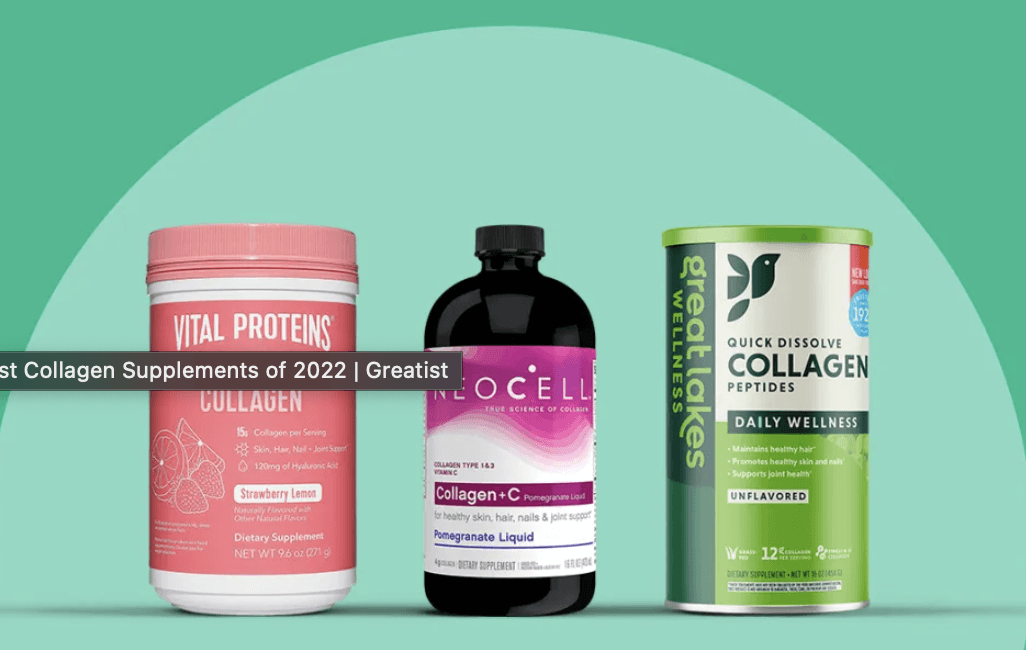
Collagen Supplements: Do They Really Work for Your Skin?
The research on taking collagen supplements to improve skin appearance is so confusing—and often contradictory—that our dermatologists in Jupiter thought we’d take a look at the most recent findings to help you sort through them.
What is Collagen?
Collagen is an essential protein that our body uses as one of the main building blocks for many of the body’s essential structures, including muscles, ligaments, tendons, bones, blood vessels, hair, and skin.
There are 29 different types of collagen in your body, including these five main types:
- Type I: strengthens skin, bones, tendons, and ligaments
- Type II: comprising the flexible cartilage in your joints
- Type III: found in blood vessels, muscles, and various internal organs
- Type IV: present in skin layers
- Type V: also present in skin layers, as well as hair and the corneas
The types you’ll usually find in a collagen supplement are Types I, II, and III, composed of different “peptides” or amino acids. Type II comes from chickens; Types I and III come from cows.
It works by making tissues throughout the body strong and resilient, and more easily able to recover after stretching.
Slowing Aging?
Of course, here we’re most concerned with the skin, and how collagen keeps it looking young and supple. Collagen makes up about 70-80 percent of your skin, which is the largest organ in your body.
“Collagen is what keeps our skin from sagging, giving us that plump, youthful look,” dermatologist Dr. Ohara Aivaz, said on the Cedars-Sinai blog.
The problem is that as we begin to age, collagen production begins to decline. In fact, after the age of 20, for each year that you age one percent less collagen is produced in the skin. Result: wrinkles and sagging skin.
“Starting in our mid-20s, we slowly begin to lose collagen,” Aivaz says. “For women, we can lose up to 30 percent of our collagen production in the first five years of menopause.”
Of course, the answer many people have turned to is supplementing with collagen. But as we mentioned, the science of whether it works is still sketchy, according to some experts.
What Research Shows
The problem with many of the studies to date is that they tend to be small samples without rigorous randomized controls.
One 2012 study published in the National Library of Medicine, for example, involved just 26 women who received a novel type of hydrolyzed collagen Type II. Although the researchers found that daily supplementation over 12 weeks “led to a significant reduction of skin dryness/scaling and global lines/wrinkles,” even the study authors suggested, “a controlled study is necessary to verify these observations.”
Another 2019 study did just that, performing a randomized, placebo-controlled, blind study—the gold standard in research—and found that a collagen supplement “significantly improved skin hydration, elasticity, roughness, and density.”
Another 2019 review of eight different studies published in the Journal of Drugs in Dermatology appeared to show that supplements could improve skin elasticity and skin aging.
Many experts doubt the body’s ability to utilize collagen in supplements, however, because part of the function of the digestive tract is to break down proteins, including the collagen protein contained in these supplements.
But one 2014 study seemed to show a positive result in wrinkle reduction from a hydrolyzed collagen peptide, and also found that for the specific collagen supplement studied, “there is substantial evidence that peptides can be hydrolyzed in the gastrointestinal tract before they are absorbed so that predominantly free amino acids can enter the circulation.”
In other words, the collagen supplement wasn’t rendered useless by the stomach.
Safety Considerations
One thing all the studies seem to agree on is that collagen supplements are generally safe.
On the other hand, some people are sensitive to the unaccustomed onslaught of protein substances in their gastrointestinal tract, and infrequent side effects that have been noted with collagen supplementation include gastrointestinal upset.
Users who may be allergic, especially to collagen supplements made from fish sources, could experience such side effects as vomiting, skin rashes, and other reactions.
And keep in mind that the U.S. Food and Drug Administration (FDA) does not test collagen supplements for safety or purity.
By the way, this does not apply to collagen injections when administered by a qualified dermatologist such as those at Genesis Dermatology. Our clients see immediate and safe results from such injections.
Alternative Sources
One thing all the experts agree on is that it’s best to obtain collagen naturally through diet.
Protein-rich foods along with those high in vitamin C naturally boost collagen production.
Such sources include eggs, dairy, grass-fed meats, bone broths, fruits and vegetables (particularly dark, green leafy vegetables and citrus fruits), legumes, nuts, whole grains, and salmon and shellfish.
In addition, beans, cabbage, garlic, and onions are rich in sulfur, which helps maintain collagen production throughout the body.
Of course, preventing damage in the first place is the best approach. Stay out of the sun, always wear sunscreen of SPF 30 or higher, and don’t smoke. Cigarette smoking not only degrades the collagen you have, but it also hinders the body’s ability to make more.

